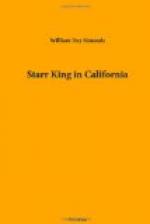It would almost appear that in telling the story of “Starr King in California” we were altogether forgetting that he did not come to the State to influence its political action, or even to alleviate poverty and distress. He came as a preacher of Liberal Christianity, and to build up the church that had honored him with a call to its pulpit. Long before he left Boston it was written concerning him, “That he loved his calling, and that it was his ambition to pay the debt which every able man is said to owe to his profession, namely to contribute some work of permanent value to its literature.” At that early period a discriminating critic bears testimony, “that his piety, pure, deep, tender, serene and warm, took hold of positive principles of light and beneficence, not the negative ones of darkness and depravity, and — himself a child of light — he preached the religion of spiritual joy.”
It was King’s first and chief ambition to be an effective preacher. In a letter, written in 1855, he says, “How we do need good preaching. Would that I could preach extempore.” A wish that six years later “came true” in his San Francisco pulpit. In the inspiring atmosphere of his new field, and under the stress of a great era, King cast his manuscript aside, and though he made careful preparation, as every man must who speaks worthily, he never again submitted to the bondage of the “written sermon.” To a man of King’s gifts and temperament this was an immense gain. Indeed, Bostonian Californians were a unit in declaring that Easterners could have no conception of the man and orator Starr King became in those last great years of his brief life.
Speedily the little church in which he preached proved too small for the throng of eager listeners who gathered to hear him, and on the 3d day of December, 1862, the corner stone of a larger and more beautiful edifice was laid.
We shall find it no easy matter to analyze the sources of his power and popularity. Often-times success and failure are equal mysteries. Doubtless no small part of his triumph arose from the peculiar character of the new society to which he brought talents that commanded instant attention. The eager temper of the time fitted his sincere and earnest spirit. It was a perfect adjustment of the man and the hour, the workman and his task.
No small part of his popularity arose from the fact that he insisted upon his right and duty as a minister to discuss great questions of state in the pulpit. The vicious gulf churchmen discover between the sacred and the secular was hidden from his eyes. All that affected the humblest of his fellow men appealed to him as part and parcel of the ’gospel of righteousness he was commissioned to preach. In the old Boston days he had discussed freely in the pulpit such themes as the “Free Soil Movement,” “The Fugitive Slave Law,” and “The Dred Scott Decision.” Burning questions these, and they were handled with no fear of man to




